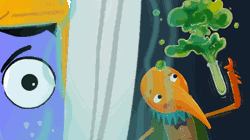- Interviews
- Agustin Cordes (Dritter Teil) (Englisch)
Interviews
Agustin Cordes (Dritter Teil) (Englisch)
Gesprächspartner: Ingmar Böke
Sprache: 
Vom:
30.08.2010
Über
Mit dem First-Person-Adventure Scratches wurde der argentinische Indie-Entwickler Agustin Cordes schlagartig einem großen Publikum bekannt. Nun ist Cordes mit seinem neuen Studio Senscape zurück und bereitet die Ankunft des Horror-Adventures Asylum vor.
Access the first part/Access the second part
A-T: Most people who are familiar with you and your work have probably noticed your appreciation for H.P. Lovecraft. Let’s talk about your relation to him for a bit: how you got in touch with his work for the first time, in which ways he left a lasting impression on you, and how you’d explain the reason for the ongoing fascination that his creations provoke etc.
Agustin: Boy, I could tell you so many Lovecraft-related stories! But I fear this interview must end someday. The first time I got in contact with Lovecraft was at the age of ten or eleven maybe. I was a very young reader really, that and playing games is the most I did during my childhood. So my dad gave me this book which contained four stories: The Call Of Cthulhu, The Colour Out Of Space, The Whisperer In Darkness and At The Mountains Of Madness. The titles alone were breathtaking and spoke of sinister, forbidden things. It was a very compulsive read. I remember devouring that book and becoming obsessed with the nightmarish take of our familiar world. I especially loved how Lovecraft managed to turn mundane things into scary: the ocean, the sky, a forest. Most of this stories take place in common places in plain daylight and you’re still awfully scared. There’s one particular passage from The Colour Out Of Space that I believe exemplifies his style, and loved so much that I included a similar line in Scratches: “I vaguely wished some clouds would gather, for an odd timidity about the deep skyey voids above had crept into my soul”. Fear of cloudless skies! What a concept!

Whenever I read Lovecraft, I feel transported to another time detailed with exhaustive descriptions and very slow pacing. I think that is what I like the most. His prose is very dense but perfect -- it has probably shaped the way I enjoy books since many popular bestsellers that read like a Hollywood script tend to bore me now. I mean, I seriously do not enjoy fast reads! I share his fascination with the past and the feeble human condition. In my view, even though many of his stories have aged, he remains one of the most original writers and is unmatched in the horror genre.
A-T: There’ve been tons of games that were connected to the work of Lovecraft in one way or another (often in a very vague way) and I’m sure that you’ve played quite a lot of them. Would you say that any of these games were able to come up with something like a “true Lovecraft spirit”? And in general: any special highlights and lowlights among these games from your point of view?
Agustin: To me, Lovecraft was always about the atmosphere, not the monsters as everybody that attempts to adapt his stories insists to highlight. I actually cringe whenever I see Lovecraft’s name associated with tentacles or some shapeless creature -- heck, I’m guilty of that myself, but at least whenever I do that I intend it to be a funny tribute. I have probably read his entire bibliography twice in my lifetime and I’m currently doing another third run (this is how obsessed I am about this work). You’ll be surprised to hear that the monsters themselves occupy a very small portion of all his literary output. Sure, you have Cthulhu who makes a very impressive appearance but, still, his bizarre description is clearly intended to make readers feel alienated, like they’re facing something incomprehensible, a forbidden knowledge that is too odd for words. In later works, Lovecraft didn’t even describe the monsters with so much detail, opting instead to say things among the lines of “the only sight of such abomination could turn you mad”. Everybody went to make this big fuzz about the Cthulhu Mythos but he never intended them to be taken at face value. You have to blame August Derleth for that.

So this is why I think there still hasn’t been one great Lovecraft adaptation because, simply put, all Lovecraft games to date are about the monsters. I still love them, mind you: Shadow Of The Comet is a personal favorite of mine and the first act, getting involved with the town, exploring the ancient forest, the shroud of mystery around everything and everyone that surrounds you, is perfect, there are many sublime moments during that sequence. Then the monsters appeared and they ruined it. Same goes for Prisoner Of Ice, which quickly became quite a mess -- for some reason, many Lovecraft adaptations tend to have stories too convoluted and hard to follow when in reality most of his works were very quaint and not much actually “happens” in them (example: The Whisperer In Darkness).
One great Lovecraft game that was not even dubbed as an adaptation is Anchorhead, easily one of the finest text adventures ever made. The Lurking Horror was a cute attempt in comparison. I believe this is about as close to the “Lovecraft spirit” as games have gotten, primarily because Michael Gentry nailed down the weird atmosphere and pace. For obvious reasons I won’t comment on Scratches itself although I will say that I tried to convey a “true” Lovecraft type of ending in a game (protagonist faces the ultimate horror and runs away), with mixed results.
Bloody hell, now look all you made me say about Lovecraft!
A-T: What other writers, despite of Lovecraft, do you consider as a direct influence on your own work?
Agustin: I read many science fiction books -- it’s the genre I happen to read the most these days. J.G. Ballard is one of my favourite authors and, although I can’t say that he has influenced any of my own work, his views on humankind and society have been very inspiring. High Rise is a book I particularly love since it’s a cunning criticism to the fierce society that we must endure these days but written in the early 70’s. Quite prophetic, just like Crash and the dangerous obsession with sex and technology that he depicted back then and has become very common now.
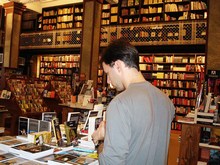
Another author that I love is Christopher Priest and, even though I’m a newcomer to his work, he’s written some of the most thought-provoking and fascinating books I’ve ever read. While Ballard was somewhat obsessed with things such as death-wish (psychologically speaking) and our relationship with technology, Priest focuses on perception of reality and identity, two subjects that I really love and - to some extent - have been featured in Scratches. Of course, I wouldn’t dare to compare any paragraph I ever wrote to his work since he’s easily the greatest living novelist right now. The first book I read of his, The Affirmation, was mind-bending: it’s about a man down on his luck who attempts to define (“affirm”) himself and by doing so he creates this imaginary world that mirrors his life but in better terms. He then begins to lose his grip on reality until you can’t be sure yourself of what’s real and not, to the point of doubting the words in the pages you’re reading. The ending feels like a hammer pummelling on your head and any attempt to describe it would be useless. Priest likes to play those sort of games with the reader, it’s like he adds a whole new dimension that has never been present in books before: the “writer’s perspective” sort to speak, and note this has nothing to do with the narrator or the protagonist. It would be impossible to adapt many of his books into movies or games because of this reason -- they are stories that are strongly tied to the written format, that are meant to work inside your mind. Very difficult to explain but, I can assure you, very engaging.
Most people are probably familiar with Priest because of The Prestige movie, a novel that I still have to read (but I loved the movie, so I’m positive that I’m in for a treat). I also recommend reading The Glamour and The Inverted World to adventure game lovers since they’re like puzzles. In fact, The Inverted World is a literary work of fantasy without peer, it deserves to be hailed as one of the best books ever written. It’s that good.

A-T: You’re known as a “storytelling guy”, who doesn’t make any secret out of his belief in the importance of strong storytelling... which unfortunately is an element that we don’t see in a lot of adventure games. What’s your take on the general state of storytelling in a genre that in theory seems to offer so much room for “real” storytelling... especially when it comes to interactive experiences of a rather mature and emotionally involving nature?
Agustin: The art of storytelling is in a poor state for every genre nowadays. During the apex of the adventures in the early 90’s we saw a very positive inclination towards a tighter narrative and literary content in games. Sadly, there’s been a worrisome step back in this regard since then and now games are again focused on the gameplay and challenge rather than the story. It sounds ironic, I know, but adventures have always been historically less “gamey” than any other genre but they were the model to follow to truly achieve artistic heights in games. If you ask me, I believe this is a very complex issue with many variables to consider: the decline of computer gaming, the rise of consoles and a very sorry state of literature in general.
Let me explain my views: adventures proliferated in personal computers, they never managed to make a splash in consoles. This is I believe because computers historically tended to offer a more cerebral, less showy gameplay. I’m not being elitist or anything here, it’s just a fact. You only need to compare the kind of RPGs or strategy games that we have seen in both markets - PC and console - to understand how they vastly differed. We’re now witnessing the oversimplification of controls and gameplay, not because it’s the “natural evolution” of games, but because consoles are ruling and therefore consumers are demanding this. There was a certain balance last decade where both markets coexisted peacefully but the reality is that consoles have been influencing PC games slowly but steadily, and this was long before large developers were forced to consider several platforms to make a living.

Every now and then you do see titles in consoles with superb storytelling: Uncharted, Alan Wake and Heavy Rain to name a few. But even in those games the story is secondary to the gameplay. Ultimately, they are games that insist on including things such as achievements, multiple endings and annoying mini-games which greatly diminish any potential impact the story could have. It’s the same with Silent Hill: they have great stories and settings but they are games forced to closely follow the formula of survival horror because that’s what people expect. As a result, they are plagued with out-of-place boss battles and trite stuff with the sole purpose to add more replay value. The single Silent Hill that dared to break the mold, Shattered Memories, was bashed to death. What can I say, the hell with replay value! If games are one day going to be called art, to be truly emotionally involving and to provide life-changing experiences, then developers, publishers and gamers alike must stop worrying about the bloody replay value, the challenge and the gameplay, and embrace the experience and story themselves. In other words, we mustn’t expect games -- I’m sure this sounds very paradoxical but that’s how I feel.
So there you have your answer: the poor storytelling that we’re seeing today (not only in games, but movies and books as well) is a reflection of our current society. It’s simply that people are not demanding deep stories anymore, they merely want to be entertained, and publishers that need to make a buck to sustain themselves are forced to divert their focus to a much broader audience. You often see publishers being blamed for the poor state of games. Well, I blame people: you get what you ask for. Only independent games, which are enjoyed by a minority, still have some room to experiment and provide more fulfilling experiences with substance and depth. It’s also because the independent really loves what he does and is more involved with the target audience.
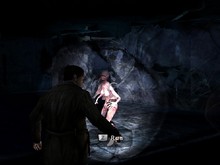
This specifically applies to adventures. Large projects need to have massive appeal to sustain themselves which is why I’m worried about big productions such as Darkstar and Gray Matter, which seems to be quite the opposite (needless to say, I sincerely hope they are both smashing successes). The independent works tend to show a more sensible approach to the storytelling aspect, they are more personal games. And this may be the key here: be personal, like a writer working on a novel. This is probably why adventures have been the most author-driven genre in videogames and enjoy the largest cast of recognised celebrities such as Roberta Williams, Jane Jensen, Steve Meretzky, Bob Bates, Al Lowe, Steve Ince and dozens of others. I’m even tempted to compare the decline of adventures with the generalised lack of interest in literature. There’s some food for thought.
A-T: If you had to pick 5 adventure games (or series) that really impressed you from a storytelling perspective throughout the years, which ones would you choose for what reasons?
Agustin: My main pick would be easy: Gabriel Knight or Jane Jensen’s work in general. Jane is also a writer which is rare for game designers, so it’s understandable that her works feature strong literary content. The research and attention of detail in the Gabriel Knight series remain unparalleled to this day. I might have given you the wrong impression before, but I do like to play new games and I’ve come to appreciate what we’re seeing in consoles -- however, when I put the newer titles in perspective and compare them to what was achieved in Gabriel Knight and other adventures, I feel like we’ve back-traced to the stone age of games.
Then most titles from Legend Entertainment, a company that could do no wrong. Nearly all of them exhibited very strong storytelling, especially in the sci-fi genre. I would probably pick Mission Critical for being one of the strongest sci-fi works in any format for the past two decades. It may have been just fine as a game but, as a story, it was huge: no game had ever managed to so wonderfully depict the human condition until Mission Critical came along.

That would be two picks still so I will also highlight Brian Moriarty’s work: Loom and Trinity. These are sensible and poignant games, the kind that we have not seen in ages. Finally, The Dark Eye which was pure storytelling and practically no gameplay. Rarely has a game made me feel so involved and suffer along with the character. It was an outstanding achievement and nobody has gotten the guts to follow its experimental steps since 1995.
A-T: As we’re getting closer to the end, I’d like to take some time to bring up a current project of yours, which has nothing to with Senscape: Not that long ago you started Slightly Deranged, a blog dedicated to cult movies and games. Please introduce the site to our readers and tell us how the whole thing came along.
Agustin: Well, it’s been a while since I wanted to start a blog. Any fool can have a blog these days, so why shouldn’t I? I love to stay in touch with people that share the same tastes like me and I feel like I have so much to say... There are many movies and games I loved and I want to make sure that kindred spirits at least knows they exist, so the focus is on the lesser known stuff. I like to see Slightly Deranged as a museum of sorts to preserve the memory of those movies and games. This way I can also write which, as I said a long time ago, at the beginning of this interview, I like to do very much. But the blog isn’t only about remembering stuff, I have also posted comments and thoughts on the current state of gaming and I always encourage discussion. That way maybe we can all figure out together just what the heck is wrong with the industry these days. I will be posting about Asylum in the future as well, so you could say that the site will act as a developer’s diary of sorts. I don’t know, I still haven’t figured out what is the focus of Slightly Deranged... It’s rather eclectic but at least it’s loads of fun!
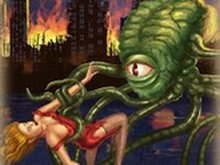
A-T: Of course, despite of all the other content on the site, Slightly Deranged is also a good outlet for your passion for horror movies. Let’s pretend that I had never seen a single horror movie in my whole life and you were supposed to give me some guidance... which 5 horror movies would I have to see at all costs (and for what reasons)?
Agustin: They are rather obvious picks, I must warn you. Strangely enough, there aren’t much arguments about what are the best horror movies ever made. I would say first and foremost Evil Dead because it’s truly a landmark achievement: as influential as a horror movie can get. I’m dead serious about this -- I can say with a straight face that it should have been a contender for an Oscar in the directing department. The last sequence is magnificent because not a single word is spoken and yet you can feel the weirdness that is going inside Bruce Campbell’s head. It’s a masterful movie in every regard, although the indie aspect tends to leap out a bit.
Then maybe Dead Alive for the exact opposite reasons: a movie that must be watched because it’s outrageous in every regard, but intentionally and done very well. It’s practically comedy rather than horror and one of my most beloved ones. I would say next Dawn Of The Dead because it’s more about the people rather than the zombies and a very strong movie in every regard. Of course, The Thing... Words really fail me. Great setting, great soundtrack, great characters, just really great everything. Hands down, the most Lovecraftian movie ever made. And The Texas Chainsaw Massacre for obvious reasons: an example of how extreme a movie can get without being excessive.

I will give you five non-popular picks, just for the heck of it: Let’s Scare Jessica To Death, for its incredible pastoral ambiance and strong storytelling. Also, a timeless performance by Zohra Lampert. The Wicker Man, which is more drama than horror. An amazing tale with very human characters, no heroes nor villains, and one of the most shocking endings seen in movies. Zombie, because I need to pick something from Lucio Fulci, it has the best zombie make-up ever made and zombies rule. Also, eye-piercing scene and zombie fighting a shark -- no further explanations needed. Next, The Changeling because it’s a perfectly crafted horror story which shines in every possible way. Unfortunately a very neglected movie but easily one of the scariest ever made. Along with House By The Cemetery and House Of The Long Shadows, probably the top three movies that most influenced Scratches.
Finally, Shock Waves. This is a very strange pick, I know, because it’s a very straightforward horror movie. However, it happens to be one of the ultimate examples in mood. You simply have to see it to understand what I mean: there something about Shock Waves that sticks in your head forever, be it the soundtrack, the setting, or the mysterious story. Those who have seen it can’t shake this feeling. A very strange movie.
A-T: Here’s a tough one, before we’re coming to an end: The last century has seen some unforgettable horror stars like Lugosi, Price, Cushing, Karloff, Lee (feel free to add further names) etc. In case that you’re able to create a short ranking of the biggest horror stars of all time, please go ahead and tell the world (OK, that might be a little exaggerated) who was the greatest of them all.
Agustin: THE greatest? Well, I know the candidates, that’s for sure: Peter Cushing, Vincent Price and Christopher Lee. It’s almost impossible to pick one of them because they have been true masters at what they did. I doubt we will ever see as prominent figures in the genre as them but, fortunately, their work will be forever with us. If I had to pick one, then I must say that I have a special fondness for Peter Cushing.
I don’t know why, I just always liked his style. He’s the ultimate educated Englishman concealing terrible secrets. However, one cannot neglect the impressive versatility of Christopher Lee either and his work that still lives to this day. There should be streets named after them, not to mention monuments to honour their figures.
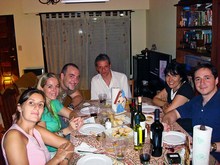
A-T: Again, thanks a lot for doing this interview, Agustin. Good luck with Senscape, Asylum and your other activities. It would be a pleasure to welcome you back here for further interviews in the future!
Agustin: Anytime! Thank you very much for this opportunity and, seriously, your support means a lot to us. I’m positive that you will enjoy Asylum and, of course, I’ll be here for another interview provided that people still have the energy to read through it. A huge cheers to all the readers of Adventure-Treff and, please, keep reading and never, ever let adventure games die!
Aktuelle Artikel
![]()
Unterstützen
![]()
Adventure-Treff-Verein
IBAN: DE38 8306 5408 0004 7212 25
BIC: GENODEF1SLR
Bitte beachtet, dass wir leider keine steuerrechtlich anrechenbare Spendenquittungen ausstellen können.
Mit jedem Einkauf bei unseren Partnern unterstützt ihr die Arbeit des Adventure-Treff e.V.


